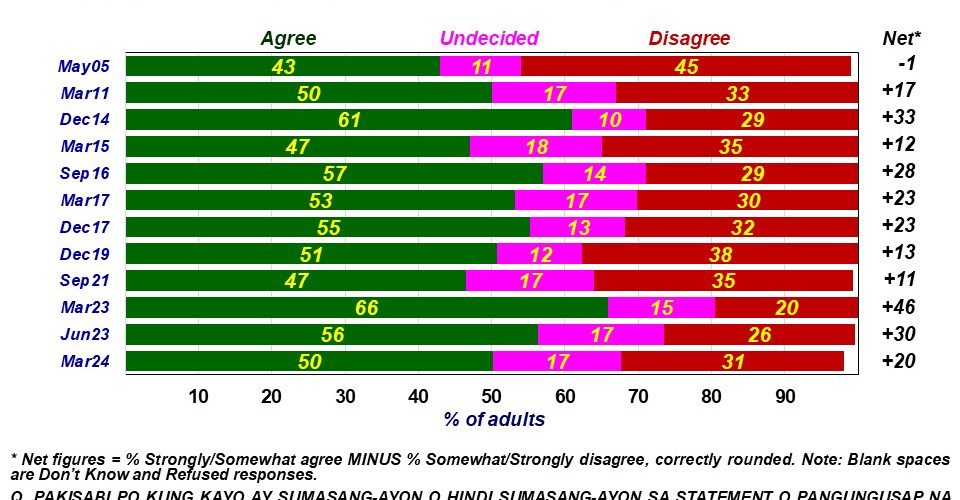Divorce: A Pastoral Option in the Catholic Church
- josnardionzon5
- Jun 4, 2024
- 9 min read
Updated: Jun 6, 2024

In the Philippines, one in four married women aged 15 to 49 experienced spousal violence, including physical, sexual, or emotional abuse, according to the 2017 National Demographic and Health Survey by the Philippine Statistics Authority. This is a troubling statistic and necessitates the separation of the victim from the violator.
Pope Francis said that in cases like domestic violence, divorce can be "morally necessary". "There are cases in which separation is inevitable," said Pope Francis regarding troubled families. "Sometimes, it can even be morally necessary when it's about shielding the weaker spouse or young children from the more serious wounds caused by intimidation and violence, humiliation and exploitation."
There is a legal remedy for domestic violence under the Anti-Violence Against Women and Their Children Act of 2004 (RA 9262) which protects an individual from intimate partner violence or domestic violence. Most of the victims of domestic violence are women and children. The court issues either a temporary protection order (effective for 30 days) or a permanent protection order (effective until the court revokes it).
The abused married woman can file a case against her abusive partner for legal separation or an annulment. However, legal separation (which does not nullify the marriage) and annulment (which declares no marriage from the start due to impediments) have their limits, aside from being lengthy and expensive. We will discuss these options below. This is why some individuals need a divorce law, an additional option to escape from a loveless, violent and abusive marriage, and allowing them to remarry and start a new life—a chance for happiness through marriage.
The Need for a Divorce Law in the Philippines*
The Philippines is the only country in the world, besides the Vatican, without an absolute divorce law. Spouses who want to end their marriages have limited options under the Family Code.
One option is to file a petition for the declaration of nullity of marriage, meaning the marriage was void from the start because:
It lacks essential and formal requirements of marriage (Art. 4), or it is void under Art. 35 of the Family Code.
One spouse is psychologically incapable of fulfilling marital obligations (Art. 36).
It is an incestuous marriage (Art. 37) or against public policy (Art. 38).
One party remarried without a final judgment declaring the previous marriage void (Art. 40).
The marriage is bigamous or polygamous (Art. 41).
Both spouses acted in bad faith in a subsequent marriage under Art. 41 of the Family Code (Art. 44).
Another option is annulment, available only if the marriage is valid but voidable due to reasons existing at the time of marriage. These reasons include:
Lack of parental consent if either party was between 18 and 21.
Insanity of either party.
Consent obtained through fraud, force, intimidation, or undue influence.
Impotence.
Serious and incurable sexually transmitted disease.
Without a divorce law, there is no legal way to dissolve valid marriages, except under Presidential Decree No. 1083, which is limited to Muslim personal laws, and Article 26 of the Family Code, which allows recognition of foreign divorce decrees when one spouse is a foreign national.
Legal remedies for troubled marriages are limited, lengthy, and expensive. Spouses often try to show their marriage breakdown was due to the other’s fault, such as infidelity, violence, or drug addiction. However, their only legal recourse is legal separation, which does not sever marital ties or allow remarriage. This means they can still be charged with adultery or concubinage if they enter new relationships, and children from such unions do not gain legitimate status.
These restrictions fail to address the need for victims of domestic abuse to heal fully. The 2017 National Demographic and Health Survey (NDHS) found that one in four married women has experienced physical, sexual, or emotional violence from their husbands or partners. Many remain married due to the lack of an absolute divorce law, despite seeking protection orders and criminal actions against their abusive partners.
Women often bear the burden of failed marriages due to cultural stereotypes and the legal system. They frequently have to provide for their children financially while dealing with loneliness and social stigma.
Filipinos' Opinion on Divorce
Based on the recent SWS survey on divorce, the following results are:
50% of Filipino adults agree, 31% disagree, and 17% are undecided about legalizing divorce for irreconcilably separated couples.
Agreement with legalizing divorce down from 55% in June 2023 and 65% in March 2023.

In March 2024, a survey found strong support for legalizing divorce among men and women with live-in partners. Men and women both showed very strong net agreement (+40 and +39, respectively).
In comparison, the support was moderately strong among widowed/separated women (+23), men who have never married (+20), women who have never married (+18), widowed/separated men (+12), married women (+12), and married men (+10).
Over time, support for legalizing divorce has generally declined among all groups since March 2023. In particular:
Men who have never married saw a drop from +41 to +20.
Women who have never married fell from +64 to +18.
Widowed/separated men declined from +50 to +12.
Widowed/separated women decreased from +38 to +23.
Married men dropped from +37 to +10.
Married women fell from +36 to +12.
Men with live-in partners went from +56 to +40.
Women with live-in partners dropped from +61 to +39.
Geographically, in March 2024, support was highest in Metro Manila (+40), moderately strong in Balance Luzon and the Visayas (+20 each), and neutral in Mindanao (+2). Support has also generally decreased in these areas since March 2023.
Below is a table chart showing the detailed results of the first quarter of 2024 compared to the results from 2005 onward.
Religion and Divorce
Results of the 2024 SWS survey based on religious affiliation.

Support for legalizing divorce varies among different religious groups:
Other Christians: Moderately strong support at +21, down from +25 in March 2023.
Catholics: Moderately strong support at +20, down from +46 in March 2023.
Muslims: Moderately strong support at +11, down from +53 in March 2023.
Iglesia ni Cristo: Moderately weak opposition at -10, down from +16 in June 2023.
These trends show a general decline in support among Catholics and Muslims over the past year, while support among other Christians has remained stable. Opposition among Iglesia ni Cristo members has increased.
Based on the results, the respondents who identified as members of the Iglesia ni Cristo strongly opposed divorce. This is most likely shaped by their reading of the Bible against divorce. Since the INC is known for bloc voting, members of Congress, especially the senators seeking re-election in the upcoming mid-term election, would think twice before voting for the divorce bill.
There are dangers in biblical fundamentalism, especially when our politicians base their political decisions on their literal reading of the biblical text. In his article, "Divorce, death penalty, and the dangers of religious fundamentalism," sociologist of religion Jayeel Cornelio wrote: "This is the misfortune of having religious fundamentalists in government. They draw on their literalist views to say no to divorce and yes to the death penalty – as if what they say is the final authority on these issues."
Catholic Church and Divorce
Support for legalizing divorce among Catholics has steadily declined from a very strong +46 in March 2023 to +30 in June 2023 and further to a moderately strong +20 in March 2024.

The Catholic Church has been mobilizing its resources to block the passage of the divorce law. The Catholic Bishops' Conference of the Philippines (CBCP) claims that divorce is "anti-family, anti-marriage, and anti-children." Some priests are sharing memes with messages such as "I am a Catholic and I say no to divorce," "Divorce is the passport to hell," "You cannot be a Catholic if you are pro-divorce," and similar statements.
While these short messages are contentious, they appear as effective ways to influence public opinion. No clergy, even the progressive ones, challenged these claims. For instance, the claim that "You cannot be Catholic if you are pro-divorce" is false. A pro-divorce individual can still be a Catholic because issues like divorce, artificial contraception, and the death penalty are not infallible and irreversible teachings or dogmas that require an act of faith. Thus, the Magisterium or authoritative Catholic teaching against divorce can be reversed depending on the call of the time.
For example, Pope Francis changed the Church's teaching on the death penalty. On 2 August 2018, the Congregation for the Doctrine of the Faith announced the revision of number 2267 of the Catechism of the Catholic Church, stating:
2267. Recourse to the death penalty on the part of legitimate authority, following a fair trial, was long considered an appropriate response to the gravity of certain crimes and an acceptable, albeit extreme, means of safeguarding the common good.
Today, however, there is an increasing awareness that the dignity of the person is not lost even after the commission of very serious crimes. In addition, a new understanding has emerged of the significance of penal sanctions imposed by the state. Lastly, more effective systems of detention have been developed, which ensure the due protection of citizens but, at the same time, do not definitively deprive the guilty of the possibility of redemption.
Consequently, the Church teaches, in the light of the Gospel, that “the death penalty is inadmissible because it is an attack on the inviolability and dignity of the person”, and she works with determination for its abolition worldwide."
Regarding the use of the Bible on marriage dissolubility, the US bishops warned that while religion can help abused women resist mistreatment, it can also become a roadblock if misinterpreted. This misinterpretation can lead to the victim's self-blame and suffering. For example, some abused women might say, "I can't leave this relationship. The Bible says it would be wrong."
The US bishops stated, "We condemn the use of the Bible to support abusive behavior in any form. A correct reading of Scripture leads to an understanding of the equal dignity of men and women and to relationships based on mutuality and love." They also mentioned that "an abused woman might see her suffering as just punishment for a past deed she feels guilty about. She may try to explain her suffering by saying it is 'God's will' or 'part of God's plan for my life' or 'God's way of teaching me a lesson.' This image of a harsh, cruel God contradicts the biblical image of a kind, merciful, and loving God. Jesus went out of his way to help suffering women, such as the woman with the hemorrhage (Mk 5:25-34) or the woman caught in adultery (Jn 8:1-11). God promises to be present with us in our suffering, even when it is unjust."
Anti-divorce Catholics tell abused women they cannot leave a loveless and abusive marriage because the Bible and the Catholic Church say so. They quote the Bible: "What therefore God has joined together, let no man put asunder" (Mt 19:6). They also cite Catholic teaching: "a ratified and consummated marriage cannot be dissolved by any human power or for any reason other than death" (CCC 2382). Worse, they tell abused women to endure and be submissive to their husbands as instructed by the Bible and the Catholic church.
This legalistic and absolutist stance of the church on divorce represents the oppressive religion and its idols that Jesus criticized for prioritizing the Sabbath over the human person. He condemned religious leaders for lacking compassion for the poor and sinners and for making salvation difficult for them.
When Jesus invited people to come to him and rest because his yoke is easy and his burden is light (Mt 11:28-30), he referred to the difficult yoke and heavy burden imposed by the religious leaders, their legalistic interpretation and strict observance of the law and tradition, on the suffering people, the poor, and the sinners. He even cursed the religious leaders because "they tie up heavy burdens [hard to carry] and lay them on people’s shoulders, but they will not lift a finger to move them" (Mt 23:4), and they "shut the door of the kingdom of heaven in people’s faces" (Mt 23:13). "Woe to you," Jesus said to the religious leaders, "you hypocrites!"
The insistence of the anti-divorce Catholics to stop Congress from legalizing divorce in our country (the only country aside from the Vatican without divorce law) is counter-evangelical. If Jesus were alive today, he would condemn these legalistic religious leaders for prioritizing the idealized institution of marriage over the well-being of individuals suffering in such relationships. By blocking the divorce bill into law, these religious leaders are closing the door for suffering married couples to be freed from irreparably failed and abusive marriages and to start a new, happy married life.
Pope Francis, while not changing the doctrine of divorce, offers a pastoral approach to dealing with married couples in problematic situations by listening to them. In his apostolic exhortation “Amoris Laetitia,” Pope Francis wrote: “At times we have also proposed a far too abstract and almost artificial theological ideal of marriage, far removed from the concrete situations and practical possibilities of real families. This excessive idealization, especially when we have failed to inspire trust in God’s grace, has not helped to make marriage more desirable and attractive, but quite the opposite.”
Pope Francis urges Catholics, especially his fellow priests, who insist on an idealized idea of marriage, to consider the real-life situations and struggles of families. Instead of closing doors for them such as refusal to give communion and threat of excommunication for divorced and remarried Catholics, he urged his fellow priests--and the people of God--to show compassion and pastoral care for them.
"The indissolubility of marriage – ‘what God has joined together, let no man put asunder’ (Mt 19:6) – should not be viewed as a ‘yoke’ imposed on humanity, but as a ‘gift’ granted to those who are joined in marriage… God’s indulgent love always accompanies our human
journey," Pope Francis wrote.
Divorce law does not address the root causes of broken marriages but serves as a remedy for irreparably broken ones. Like any struggle for freedom, victims must resist, even against evils protected by outdated doctrines that no longer help married couples in difficult situations.
*Data and information from the Philippine Commission on Women.















































Comments